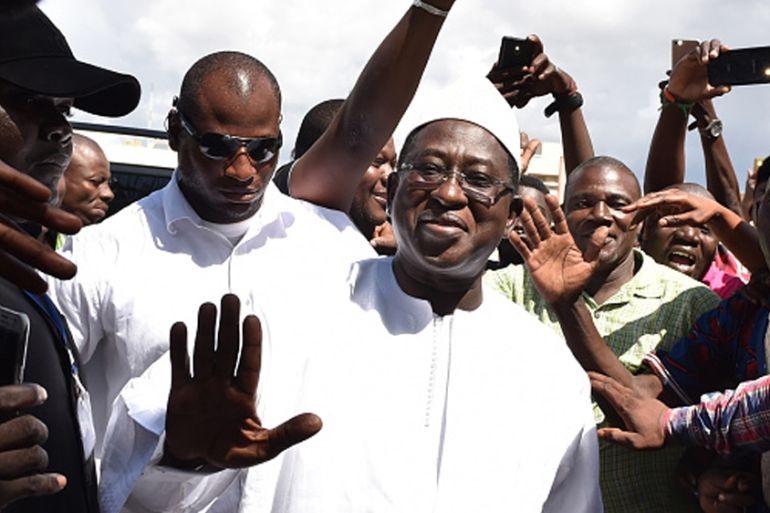Mali: Soumaila Cisse rejects results as ballot counting under way
Mali opposition candidate Soumaila Cisse charges fraud in Mali elections marked by low turnout due to security fears.

Opposition leader Soumaila Cisse says he will reject the results of Mali’s presidential runoff vote, urging people in the country “to rise up”.
Sunday’s poll, which was marked by a low turnout amid security concerns and voter apathy, pitted Cisse against incumbent President Ibrahim Boubacar Keita.
Keep reading
list of 4 itemsThe Take: What would a third Modi term mean for India?
Full jury panel seated on third day of Trump’s New York hush-money trial
Jacob Zuma’s nine lives: How South Africa’s ex-president keeps coming back
Ballot counting was under way on Monday across the country, with official second-round results expected for a few days.
“The fraud is proven; this is why there are results we will not accept,” Cisse told reporters on Monday at his party’s headquarters in the capital, Bamako.
“I call on all Malians to rise up … We will not accept the dictatorship of fraud,” he said.
Cisse had accused the government camp of cheating in the first round, which saw him securing 18 percent of the vote against Keita’s 41 percent.
“We have a large lead. We do not accept that our voice is stolen,” Cisse, who heads the Union for the Republic and Democracy (URD) party, added on Monday.
|
|
“This fight is in your hands, dear supporters… Let’s get engaged to save Mali.”
Cisse’s party told AFP in the early hours of Sunday that ballot papers were already circulating, several hours before polls opened.
In at least six stations in the capital of Bamako, voting reports – which give the number of voters and votes cast for each candidate – were signed before the numbers were filled in, an AFP journalist witnessed.
But Mohamed Dileita, head of an observation mission from the Paris-based OIF, a federation of French-speaking nations, said that “everyone has more or less accepted the verdict … the vote took place.”
“At the time I speak, at least, it is a calm election, credible. At the moment we do not see any reason why it changes,” Dileita told Radio France Internationale.
The three main opposition candidates had mounted a last-ditch legal challenge to the first-round result, alleging ballot-box stuffing and other irregularities, but their petition was rejected by the Constitutional Court.
Low turnout
But the elections were also marked by voters staying away from the polls.
Threats by armed fighters forced nearly 500 polling stations – about two percent of the total – to stay closed during Sunday’s runoff, the government said. One election official was killed in northern Niafunke, in Timbuktu region.
Most of the shuttered polling stations were in the Timbuktu region and the conflict-hit central region of Mopti, Security Minister Salif Traore told reporters.
Thousands of troops had been deployed across Mali to protect voters after widespread violence in the first round.
Security fears severely dampened the turnout, which a civil society group, the Mali Citizen Observation Pool (POCIM), estimated at just over 27 percent of the eight million registered voters. Turnout is usually about 40 percent in Malian elections.
|
|
“Voters did not mobilise much to fulfil their civic duty,” POCIM said in its report.
“The reasons given relate to the security problem and the lack of enthusiasm following the publication of the results of the first round.”
It reported isolated incidents of ballot stealing and attacks on polling stations, including two which were torched.
A report by the European Union (EU) observer mission will be important for the credibility of the election, though it was not clear on Monday when it would be published.
On Sunday the EU mission said the voting had passed peacefully for the most part, although it had no monitors in Mopti, Kidal and Timbuktu regions due to the security threat.
Mali, a landlocked nation home to at least 20 ethnic groups where the majority of people live on less than $2 a day, has battled attacks by armed groups and intercommunal violence for years.
Peace agreements signed in 2015 by the government and rebel coalitions raised hopes of stability, but their meaningful implementation has been challenging.
As a result, the security situation remains fragile in the face of continued violent attacks, mainly in the country’s north and central regions.